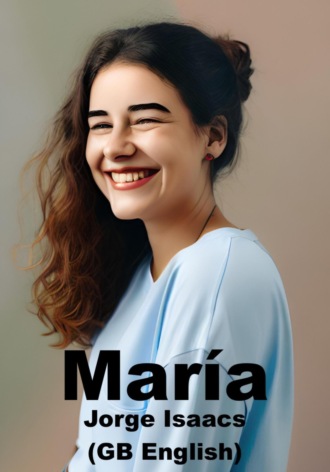
Jorge Isaacs
Maria (GB English)
I descended to the mountainous plain of the river by the same path by which I had done so many times six years before. The thunder of its flow was increasing, and before long I discovered the streams, impetuous as they rushed over the falls, boiling into boiling foam in the falls, crystal clear and smooth in the backwaters, always rolling over a bed of moss-covered boulders, fringed on the banks by iracales, ferns and reeds with yellow stems, silky plumage and purple seed-beds.
I stopped in the middle of the bridge, formed by the hurricane with a stout cedar, the same where I had once passed. Flowery parasites hung from its slats, and blue and iridescent bells came down in festoons from my feet to sway in the waves. A luxuriant and haughty vegetation vaulted the river at intervals, and through it a few rays of the rising sun penetrated, as through the broken roof of a deserted Indian temple. Mayo howled cowardly on the bank I had just left, and at my urging resolved to pass over the fantastic bridge, taking at once, before me, the path that led to the possession of old José, who was expecting from me that day the payment of his welcome visit.
After a little steep and dark slope, and after skipping over the dry trees from the last felling of the highlander, I found myself in the little place planted with vegetables, from where I could see the little house in the midst of the green hills, which I had left among seemingly indestructible woods, smoking. The cows, beautiful in their size and colour, bellowed at the corral gate in search of their calves. The domestic fowls were in an uproar, receiving their morning ration; in the palm trees near by, which had been spared by the axe of the husbandmen, the oropendolas swayed noisily in their hanging nests, and in the midst of such a pleasant hubbub, one could sometimes hear the shrill cry of the birdcatcher, who, from his barbecue and armed with a slingshot, shooed away the hungry macaws that fluttered over the cornfield.
The Antioquian's dogs gave him warning of my arrival with their barking. Mayo, fearful of them, approached me sullenly. José came out to greet me, axe in one hand and hat in the other.
The little dwelling denoted industriousness, economy and cleanliness: everything was rustic, but comfortably arranged, and everything in its place. The living-room of the little house, perfectly swept, with bamboo benches all round, covered with reed mats and bearskins, some illuminated paper prints representing saints, and pinned with orange thorns to the unbleached walls, had on the right and left the bedroom of Joseph's wife and that of the girls. The kitchen, made of reed and with a roof of leaves of the same plant, was separated from the house by a small vegetable garden where parsley, camomile, pennyroyal and basil mingled their aromas.
The women seemed more neatly dressed than usual. The girls, Lucia and Transito, wore petticoats of purple sarsen, and very white shirts with lace gowns trimmed with black braid, under which they hid part of their rosaries, and chokers of opal-coloured glass bulbs. The thick, jet-coloured plaits of their hair played on their backs at the slightest movement of their bare, careful, restless feet. They spoke to me with great shyness; and it was their father who, noticing this, encouraged them, saying: "Is not Ephraim the same child, because he comes from school wise and grown up? Then they became more jovial and smiling: they linked us amicably with the memories of childhood games, powerful in the imagination of poets and women. With old age, José's physiognomy had gained a lot: although he did not grow a beard, his face had something biblical about it, like almost all those of the old men of good manners in the country where he was born: abundant grey hair shaded his broad, toasted forehead, and his smiles revealed a calmness of soul. Luisa, his wife, happier than he in the struggle with the years, retained in her dress something of the Antioquian manner, and her constant joviality made it clear that she was content with her lot.
José led me to the river, and told me of his sowing and hunting, while I plunged into the diaphanous backwater from which the water cascaded in a small waterfall. On our return we found the provocative lunch served at the only table in the house. Corn was everywhere: in the mote soup served in glazed earthenware dishes and in golden arepas scattered on the tablecloth. The only piece of cutlery was crossed over my white plate and bordered with blue.
Mayo sat at my feet looking attentive, but more humble than usual.
José was mending a fishing line while his daughters, clever but shameful, served me with care, trying to guess in my eyes what I might be lacking. They had beautified themselves, and from being little girls, they had become official women.
After gulping down a glass of thick, frothy milk, the dessert of that patriarchal lunch, José and I went out to look around the orchard and the brushwood I was picking. He was amazed at my theoretical knowledge of sowing, and we returned to the house an hour later to say goodbye to the girls and my mother.
I put the good old man's mountain knife, which I had brought him from the kingdom, round his waist; around the necks of Tránsito and Lucía, precious rosaries, and in Luisa's hands a locket that she had entrusted to my mother. I took the turn of the mountain when it was noon by the edge of the day, according to José's examination of the sun.
Chapter X
On my return, which I did slowly, the image of Mary came back to my memory. Those solitudes, its silent forests, its flowers, its birds and its waters, why did they speak to me of her? What was there of Mary in the damp shadows, in the breeze that moved the foliage, in the murmur of the river? It was that I saw Eden, but she was missing; it was that I could not stop loving her, even though she did not love me. And I breathed in the perfume of the bouquet of wild lilies that Joseph's daughters had formed for me, thinking that perhaps they would deserve to be touched by Mary's lips: thus my heroic resolutions of the night had been weakened in so few hours.
As soon as I got home, I went to my mother's sewing room: Maria was with her; my sisters had gone to the bathroom. After answering my greeting, Maria lowered her eyes to her sewing. My mother expressed her delight at my return; they had been startled at home by the delay, and had sent for me at that moment. I talked to her, pondering over Joseph's progress, and Mayo tongued my dresses to get rid of the hips that had got caught in the weeds.
Mary raised her eyes again, and fixed them on the bunch of lilies which I held in my left hand, while I leaned with my right on the shotgun: I thought I understood that she wanted them, but an indefinable fear, a certain respect for my mother and my intentions for the evening, prevented me from offering them to her. But I delighted in imagining how beautiful one of my little lilies would look on her lustrous brown hair. They must have been for her, for she would have gathered orange blossoms and violets in the morning for the vase on my table. When I went into my room I did not see a flower there. If I had found a viper rolled up on the table, I would not have felt the same emotion as the absence of the flowers: its fragrance had become something of Mary's spirit that wandered around me in the hours of study, that swayed in the curtains of my bed during the night.... Ah, so it was true that she did not love me, so my visionary imagination had been able to deceive me so much! And what could I do with the bouquet I had brought for her? If another woman, beautiful and seductive, had been there at that moment, at that moment of resentment against my pride, of resentment against Mary, I would have given it to her on condition that she would show it to all and beautify herself with it. I lifted it to my lips as if to bid farewell for the last time to a cherished illusion, and threw it out of the window.
Chapter XI
I made efforts to be jovial for the rest of the day. At the table I spoke enthusiastically about the beautiful women of Bogotá, and intentionally praised P***'s graces and wit. My father was pleased to hear me: Eloísa would have wanted the after-dinner conversation to last into the night. Maria was silent; but it seemed to me that her cheeks sometimes grew pale, and that their primitive colour had not returned to them, like that of the roses which during the night have adorned a feast.
Towards the latter part of the conversation, Mary had pretended to play with the hair of John, my three-year-old brother whom she spoiled. She put up with it to the end; but as soon as I got to my feet, she went with the child into the garden.
All the rest of the afternoon and into the early evening it was necessary to help my father with his desk work.
At eight o'clock, after the women had said their usual prayers, we were called into the dining room. As we sat down to table, I was surprised to see one of the lilies on Mary's head. There was such an air of noble, innocent, sweet resignation in her beautiful face that, as if magnetised by something unknown to me in her until then, I could not help looking at her.
Loving, laughing girl, as pure and seductive a woman as those I had dreamed of, so I knew her; but resigned to my disdain, she was new to me. Divinised by resignation, I felt unworthy to fix a glance on her brow.
I answered wrongly to some questions that were put to me about Joseph and his family. My father could not conceal my embarrassment; and turning to Mary, he said with a smile:
–Beautiful lily in your hair: I have not seen such in the garden.
Maria, trying to conceal her bewilderment, replied in an almost imperceptible voice:
–There are only lilies of this kind in the mountains.
I caught at that moment a kindly smile on Emma's lips.
–And who sent them? -asked my father.
Mary's confusion was already noticeable. I looked at her; and she must have found something new and encouraging in my eyes, for she answered with a firmer accent:
–Ephraim threw some into the garden; and it seemed to us that, being so rare, it was a pity they should be lost: this is one of them.
–Mary," said I, "if I had known that these flowers were so dear, I should have kept them for you; but I have found them less beautiful than those which are daily placed in the vase on my table.
She understood the cause of my resentment, and a glance of hers told me so plainly, that I feared the palpitations of my heart might be heard.
That evening, just as the family was leaving the salon, Maria happened to be sitting near me. After hesitating for a long time, I finally said to her in a voice that betrayed my emotion: "Maria, they were for you, but I couldn't find yours".
She stammered some apology when, tripping over my hand on the sofa, I held hers by a movement beyond my control. She stopped talking. Her eyes looked at me in astonishment and fled from mine. He ran his free hand anxiously across his forehead, and leaned his head on it, sinking his bare arm into the immediate cushion. At last, making an effort to undo that double bond of matter and soul which at such a moment united us, she rose to her feet; and as if concluding a commenced reflection, she said to me so quietly that I could scarcely hear her, "Then … I will pick the prettiest flowers every day," and disappeared.
Souls like Mary's are ignorant of the worldly language of love; but they shudder at the first caress of the one they love, like the poppy of the woods under the wing of the winds.
I had just confessed my love to Mary; she had encouraged me to confess it to her, humbling herself like a slave to pick those flowers. I repeated her last words to myself with delight; her voice still whispered in my ear: "Then I will pick the most beautiful flowers every day".
Chapter XII
The moon, which had just risen full and large under a deep sky over the towering crests of the mountains, illuminated the jungle slopes, whitened in places by the tops of the yarumos, silvering the foams of the torrents and spreading its melancholy clarity to the bottom of the valley. The plants exhaled their softest and most mysterious aromas. That silence, interrupted only by the murmur of the river, was more pleasing than ever to my soul.
Leaning on my elbows on my window frame, I imagined seeing her in the midst of the rose bushes among which I had surprised her on that first morning: she was there gathering the bouquet of lilies, sacrificing her pride to her love. It was I who would henceforth disturb the childish sleep of her heart: I could already speak to her of my love, make her the object of my life. Tomorrow! magical word, the night when we are told that we are loved! Her gaze, meeting mine, would have nothing more to hide from me; she would be beautified for my happiness and pride.
Never were the July dawns in the Cauca as beautiful as Maria when she presented herself to me the next day, moments after coming out of the bath, her tortoiseshell hair shaded loose and half curled, her cheeks a softly faded rose-colour, but at times fanned by blushing; and playing on her affectionate lips that most chaste smile which reveals in women like Maria a happiness which it is not possible for them to conceal. Her looks, now more sweet than bright, showed that her sleep was not so peaceful as it had been. As I approached her, I noticed on her forehead a graceful and barely perceptible contraction, a sort of feigned severity that she often used with me when, after dazzling me with all the light of her beauty, she would impose silence on my lips, about to repeat what she knew so well.
It was already a necessity for me to have her constantly by my side; not to lose a single instant of her existence abandoned to my love; and happy with what I possessed, and still eager for happiness, I tried to make a paradise of the paternal house. I spoke to Maria and my sister of the desire they had expressed to do some elementary studies under my direction: they were again enthusiastic about the project, and it was decided that from that very day it would begin.
They turned one of the corners of the living room into a study cabinet; they unpinned some maps from my room; they dusted off the geographic globe that had hitherto been ignored on my father's desk; two consoles were cleared of ornaments and made into study tables. My mother smiled as she witnessed all the disarray that our project entailed.
We met every day for two hours, during which time I would explain a chapter or two of geography, and we would read a little universal history, and more often than not many pages of the Genius of Christianity. I was then able to appreciate the full extent of Maria's intelligence: my sentences were indelibly engraved on her memory, and her comprehension almost always preceded my explanations with childlike triumph.
Emma had surprised the secret, and was pleased with our innocent happiness; how could I conceal from her, in those frequent conferences, what was going on in my heart? She must have observed my motionless gaze on her companion's bewitching face as she gave a requested explanation. She had seen Maria's hand tremble if I placed it on some point sought in vain on the map. And whenever, sitting near the table, with them standing on either side of my seat, Mary bent down to get a better view of something in my book or on the cards, her breath, brushing my hair, her tresses, rolling from her shoulders, disturbed my explanations, and Emma could see her straighten up modestly.
Occasionally, household chores would come to the attention of my disciples, and my sister would always take it upon herself to go and do them, only to return a little later to join us. Then my heart was pounding. Mary, with her childishly grave forehead and almost laughing lips, would abandon to mine some of her dimpled, aristocratic hands, made for pressing foreheads like Byron's; and her accent, without ceasing to have that music which was peculiar to her, became slow and deep as she pronounced softly articulated words which in vain would I try to remember to-day; for I have not heard them again, because pronounced by other lips they are not the same, and written on these pages they would appear meaningless. They belong to another language, of which for many years not a sentence has come to my memory.
Chapter XIII
The pages of Chateaubriand were slowly giving a touch of colour to Mary's imagination. So Christian and full of faith, she rejoiced to find the beauties she had foreseen in Catholic worship. Her soul took from the palette that I offered her the most precious colours to beautify everything; and the poetic fire, a gift of Heaven that makes men admirable who possess it and divinises women who reveal it in spite of themselves, gave her countenance charms hitherto unknown to me in the human face. The poet's thoughts, welcomed in the soul of that woman so seductive in the midst of her innocence, came back to me like the echo of a distant and familiar harmony that stirs the heart.
One evening, an evening like those of my country, adorned with clouds of violet and pale gold, beautiful as Mary, beautiful and transitory as it was for me, she, my sister and I, seated on the broad stone of the slope, from where we could see to the right in the deep valley roll the noisy currents of the river, and with the majestic and silent valley at our feet, I read the episode of Atala, and the two of them, admirable in their immobility and abandonment, heard from my lips all that melancholy that the poet had gathered to "make the world weep". My sister, resting her right arm on one of my shoulders, her head almost joined to mine, followed with her eyes the lines I was reading. Maria, half-kneeling near me, did not take her wet eyes off my face.
The sun had gone down as I read the last pages of the poem in an altered voice. Emma's pale head rested on my shoulder. Maria hid her face with both hands. After I had read that heart-rending farewell of Chactas over the grave of his beloved, a farewell which has so often wrung a sob from my breast: "Sleep in peace in a foreign land, young wretch! In reward for thy love, thy banishment and thy death, thou art forsaken even of Chactas himself," Mary, ceasing to hear my voice, uncovered her face, and thick tears rolled down her face. She was as beautiful as the poet's creation, and I loved her with the love he imagined. We walked slowly and silently to the house, and my soul and Maria's were not only moved by the reading, they were overwhelmed with foreboding.
Chapter XIV
After three days, on coming down from the mountain one evening, I seemed to notice a start in the countenances of the servants whom I met in the inner corridors. My sister told me that Maria had had a nervous attack; and, adding that she was still senseless, endeavoured to soothe my painful anxiety as much as possible.
Forgetting all precaution, I entered the bedchamber where Maria was, and mastering the frenzy that would have made me clasp her to my heart to bring her back to life, I approached her bed in bewilderment. At the foot of it sat my father: he fixed on me one of his intense glances, and then turning it on Mary, seemed to want to remonstrate with me by showing her to me. My mother was there; but she did not raise her eyes to look for me, for, knowing my love, she pitied me as a good mother pities her child, as a good mother pities her own child in a woman loved by her child.
I stood motionless gazing at her, not daring to find out what was wrong with her. She was as if asleep: her face, covered with a deadly pallor, was half hidden by her dishevelled hair, in which the flowers I had given her in the morning had been crumpled; her contracted forehead revealed an unbearable suffering, and a light perspiration moistened her temples; tears had tried to flow from her closed eyes, which glistened on the lashes of her eyelashes.
My father, understanding all my suffering, rose to his feet to retire; but before leaving, he approached the bed, and taking Mary's pulse, said:
–It's all over. Poor child! It is exactly the same evil that her mother suffered from.
Mary's bosom rose slowly as if to form a sob, and returning to its natural state, she exhaled only a sigh. My father being gone, I placed myself at the head of the bed, and forgetting my mother and Emma, who remained silent, I took one of Maria's hands from the cushion, and bathed it in the torrent of my tears hitherto restrained. It measured all my misfortune: it was the same malady as her mother's, who had died very young, attacked by an incurable epilepsy. This idea took possession of my whole being to break it.
I felt some movement in that inert hand, to which my breath could not return the warmth. Mary was already beginning to breathe more freely, and her lips seemed to struggle to utter a word. She moved her head from side to side, as if trying to throw off an overwhelming weight. After a moment's repose, she stammered unintelligible words, but at last my name was clearly perceived among them. As I stood, my gaze devouring her, perhaps I pressed my hands too tightly in hers, perhaps my lips called out to her. She slowly opened her eyes, as if wounded by an intense light, and fixed them on me, making an effort to recognise me. Half sitting up a moment later, "What is it?" she said, drawing me aside; "What has happened to me?" she continued, turning to my mother. We tried to reassure her, and with an accent in which there was something of remonstrance, which I could not at the time explain to myself, she added, "You see, I was afraid.
She was, after the access, in pain and deeply saddened. I returned in the evening to see her, when the etiquette established in such cases by my father permitted it. As I bade her farewell, holding my hand for a moment, she said, "See you to-morrow," and emphasised this last word as she used to do whenever our conversation was interrupted in some evening, looking forward to the next day for us to conclude it.
Chapter XV
As I went out into the corridor that led to my room, an impetuous breeze was swaying the willows in the courtyard; and as I approached the orchard, I heard it tearing through the orange groves, from which the frightened birds were darting. Faint flashes of lightning, like the instantaneous reflection of a buckler wounded by the glow of a fire, seemed to want to illuminate the gloomy bottom of the valley.
Leaning against one of the columns in the corridor, without feeling the rain lashing at my temples, I thought of Mary's illness, about which my father had spoken such terrible words; my eyes wanted to see her again, as in the silent and serene nights that might never come again!
I don't know how much time had passed, when something like the vibrating wing of a bird came to brush against my forehead. I looked towards the immediate woods to follow it: it was a black bird.
My room was cold; the roses at the window trembled as if they feared to be abandoned to the rigours of the tempestuous wind; the vase contained already withered and fainting the lilies that Mary had placed in it in the morning. At this a gust of wind suddenly blew out the lamp; and a clap of thunder let its rising rumble be heard for a long time, as if it were that of a gigantic chariot plunging from the rocky peaks of the mountain.
In the midst of that sobbing nature, my soul had a sad serenity.
The clock in the living room had just struck twelve. I heard footsteps near my door, and then my father's voice calling me. "Get up," he said as soon as I answered; "Maria is still unwell.
The access had been repeated. After a quarter of an hour I was ready to leave. My father was giving me the last indications about the symptoms of the illness, while the little black Juan Angel was quieting my impatient and frightened horse. I mounted; his shod hooves crunched on the cobbles, and a moment later I was riding down towards the plains of the valley, looking for the path in the light of some livid flashes of lightning. I was going in search of Dr. Mayn, who was then spending a season in the country three leagues from our farm.
The image of Mary as I had seen her in bed that afternoon, as she said to me, "See you tomorrow," that perhaps she would not come, was with me, and, quickening my impatience, made me measure incessantly the distance that separated me from the end of the journey; an impatience which the speed of the horse was not enough to moderate,
The plains began to disappear, fleeing in the opposite direction to my run, like immense blankets swept away by the hurricane. The forests that I thought were closest to me seemed to recede as I advanced towards them. Only the moaning of the wind among the shady fig-trees and chiminangos, only the weary wheezing of the horse and the clash of its hoofs on the sparking flints, interrupted the silence of the night.
Some huts of Santa Elena were on my right, and soon after I stopped hearing the barking of their dogs. Sleeping cows on the road began to make me slow down.
The beautiful house of the lords of M***, with its white chapel and its ceiba groves, could be seen in the distance in the first rays of the rising moon, like a castle whose towers and roofs had crumbled with the passing of time.
The Amaime was rising with the rains of the night, and its roar announced it to me long before I reached the shore. By the light of the moon, which, piercing the foliage of the banks, was going to silver the waves, I could see how much its flow had increased. But I could not wait: I had done two leagues in an hour, and it was still too little. I put my spurs to the horse's hindquarters, and with his ears laid back towards the bottom of the river, and snorting deafly, he seemed to calculate the impetuosity of the waters that were lashing at his feet: he plunged his hands into them, and, as if overcome by an invincible terror, he spun back on his legs. I stroked his neck and moistened his mane, and again prodded him into the river; then he threw up his hands impatiently, asking at the same time for all the rein, which I gave him, fearful that I had missed the flood-hole. He went up the bank about twenty rods, taking the side of a crag; he brought his nose close to the foam, and raising it at once, plunged into the stream. The water covered almost all of me, reaching up to my knees. The waves soon curled around my waist. With one hand I patted the animal's neck, the only visible part of its body, while with the other I tried to make it describe the cut line more curved upwards, because otherwise, having lost the lower part of the slope, it was inaccessible due to its height and the force of the water, which swung over the broken branches. The danger had passed. I alighted to examine the girths, one of which had burst. The noble brute shook himself, and a moment later I continued my march.
After a quarter of a league, I crossed the waves of the Nima, humble, diaphanous and smooth, which rolled illuminated until they were lost in the shadows of silent forests. I left the pampa of Santa R., whose house, in the midst of ceiba groves and under the group of palm trees that raise their foliage above its roof, resembles on moonlit nights the tent of an oriental king hanging from the trees of an oasis.
It was two o'clock in the morning when, after crossing the village of P***, I dismounted at the door of the house where the doctor lived.
Chapter XVI
In the evening of the same day the doctor took leave of us, after leaving Maria almost completely recovered, and having prescribed a regimen to prevent a recurrence of the access, and promised to visit her frequently. I was unspeakably relieved to hear him assure her that there was no danger, and for him, twice as fond as I had hitherto been of her, just because such a speedy recovery was predicted for Maria. I went into her room, as soon as the doctor and my father, who was to accompany him a league's journey, had set out. She was just finishing braiding her hair, looking at herself in a mirror that my sister held up on the cushions. Blushing, she pushed the piece of furniture aside and said to me:
–These are not the occupations of a sick woman, are they? but I am well enough. I hope I shall never again cause you such a dangerous journey as last night.
–There was no danger on that trip," I replied.
–The river, yes, the river! I thought of that and of so many things that could happen to you because of me.
A three-league journey? You call this…?
–That voyage on which you might have drowned," said the doctor here, so surprised, that he had not yet pressed me, and was already talking about it. You and he, on your return, had to wait two hours for the river to go down.
–The doctor on horseback is a mule; and his patient mule is not the same as a good horse.
–The man who lives in the little house by the pass," Maria interrupted me, "when he recognised your black horse this morning, he was amazed that the rider who jumped into the river last night had not drowned just as he was shouting to him that there was no ford. Oh, no, no; I don't want to get sick again. Hasn't the doctor told you that I won't get sick again?
–Yes," I replied; "and he has promised me not to let two days in succession pass in this fortnight without coming to see you.
–Then you won't have to make another overnight trip. What would I have done if I…
–You would have cried a lot, wouldn't you? -I replied with a smile.
He looked at me for a few moments, and I added:
–Can I be sure of dying at any time convinced that…
–From what?
And guessing the rest in my eyes:
–Always, always! -she added almost secretly, appearing to examine the beautiful lace on the cushions.
–And I have very sad things to say to you," he continued after a few moments' silence; "so sad, that they are the cause of my illness. You were on the mountain. Mamma knows all about it; and I heard papa tell her that my mother had died of a disease whose name I never heard; that you were destined to make a fine career; and that I – I – I don't know whether it's a matter of the heart or not. Ah, I don't know whether what I heard is true – I don't deserve that you should be as you are with me.







